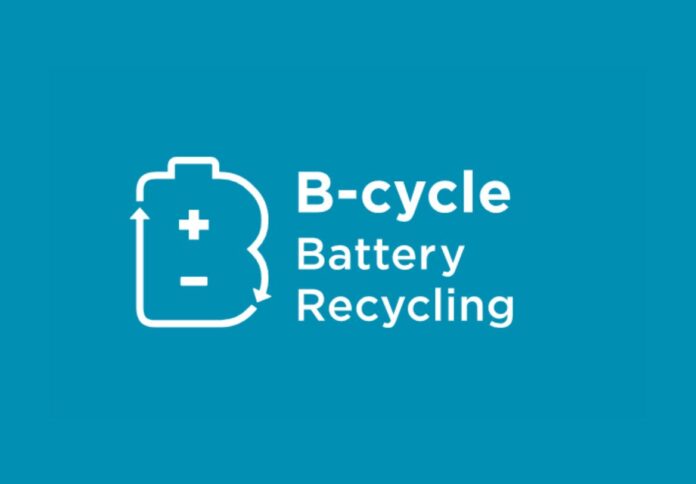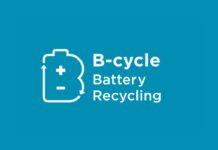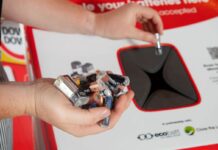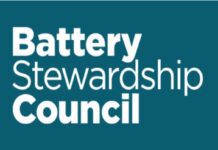
Media Release by Battery Stewardship Council
Australia’s official government-backed battery recycling Scheme, B-cycle, has today released its first performance report – Positive Charge, highlighting the rapid scale and pace of the innovative product stewardship scheme since launch in February this year.
The Scheme has doubled the national collection rate of loose batteries and power tool batteries, recycling the equivalent of 38 million AA batteries in its first six months – enough loose batteries to wrap halfway around the world.
Founded by not-for-profit organisation, the Battery Stewardship Council (BSC), B-cycle aims to combat one of the nation’s fastest-growing waste streams by providing Drop-off points in thousands of locations for people to safely and conveniently recycle everyday loose batteries. Every year, Australians buy enough batteries to circle the planet Earth 7.2 times and until now 90% of these used batteries have been going to landfill, causing environmental impact and wasting precious resources.
The Positive Charge Report reveals that in just six months:
- B-cycle has significantly increased consumer access to battery recycling by establishing 3,200 Drop-off points across all states and territories
- The scheme has collected over 918,000kg of used batteries from across Australia.
- Australians are increasingly motivated to recycle their used batteries; with the B-cycle website servicing over 65,000 unique searches for the closest B-cycle drop-off point
- B-cycle has seen impressive participation with over 100 organisations participating including 48 importers & 28 retailers
- B-cycle continues to attract leading industry brands
- An estimated 90% of loose battery imports are now covered by the Scheme
B-cycle CEO Libby Chaplin attributes the Scheme’s expansive progress to their open-source model, which involves everyone in the supply chain, from battery brands and retailers, to Drop-off points and recyclers. “Our membership uptake points towards a paradigm shift in product stewardship, which has shown that rapid change can occur when an entire industry is mobilised to participate, rather than relying on the traditional service provider approach,” said Chaplin.
“Not only are we helping our members deliver their corporate social responsibility objectives, feedback confirms the Scheme is helping them attract more customers. We’re also addressing the growing scarcity of battery metals and the importance of investing in a strong recycling sector that is able to secure quality materials for future generations. But we need support from every manufacturer, importer, retailer and recycler in the life cycle of a battery. With their involvement in B-cycle we can make this future a definite reality.” added Chaplin.
By engaging over 90% of Australia’s loose battery and power tool battery brands, B-cycle is seeing that all batteries collected are recycled, with robust traceability and accreditation for all participants.
Milwaukee Tools’ Group Managing Director, Michael Brendle, says that “We are committed to reducing our environmental impact and giving users the confidence that Milwaukee® represents a circular economy. We are proud to be aligned with the B-cycle battery recycling scheme to help deliver effective waste management. B-cycle’s independent accreditation and rigorous standards assure consumers that every end-of-life battery they recycle is remanufactured into new materials, and they are actively helping to improve the environment for future generations.”
Duracell Australia, General Manager Mariusz Surmacz said, “Duracell recognises the importance of sustainability and is proud to be one of the founders of the ‘B-cycle’ Stewardship Scheme in Australia. In our sustainability journey, Duracell goes beyond the regular stewardship scheme. At Duracell we also make sure that our cardboard packs are made from recycled material and are fully recyclable, while all our blisters are made from recycled PET. Becoming a fully accredited ‘B-cycle’ stewardship scheme participant aligns with our values of category leadership and innovation, and it is a visible sign of Duracell’s strong and long-term commitment to the sustainable batteries collection and recycling program.”
Chaplin concluded, “The Scheme’s early successes demonstrate what is possible when the whole industry comes together and provides a valuable foundation for the fast-growing battery energy storage and electric vehicle sectors. As the Scheme nears one year of operation, we are focussing on expanding our network into these burgeoning sectors whilst improving safety in all aspects of the battery life cycle and setting Australia on the right course to match the recycling capabilities of global leaders.”
In the coming months, B-cycle will be releasing important research to understand life cycle impacts, assess the market, and evaluate the economics of the Scheme.
To read the full report head to the B-cycle website or HERE.

















